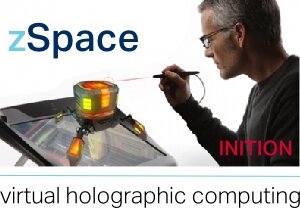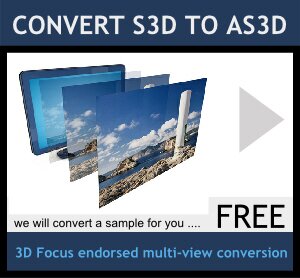Toshiba Glasses Free 3D TVs Shock Disappointment
Toshiba have admitted to being dissappointed with the sales figures of their glasses free 3D televisions which have sold less than half of what was expected according to Bloomberg.
 Toshiba launched two glasses free 3D models in December 2010 – the 12 inch 12GL1 and 20 inch 20GL1. Just 500 consumers have been persuaded by the glasses free 3D tech, less than half of the 1000 Toshiba expected sales for the 20GL1 during the launch month. Sales figures were even more depressing for the 12 inch model.
Toshiba launched two glasses free 3D models in December 2010 – the 12 inch 12GL1 and 20 inch 20GL1. Just 500 consumers have been persuaded by the glasses free 3D tech, less than half of the 1000 Toshiba expected sales for the 20GL1 during the launch month. Sales figures were even more depressing for the 12 inch model.
The glasses free 3D TVs from Toshiba offer 9 viewpoints by deploying a perpendicular lenticular sheet and image processing technology to display "smooth, natural images". The 20GL1 contains 4 times as many pixels (8.29 million pixels) as a full HD monitor hence a huge asking price of £1800 (240,000 Japanese Yen).
The two models are part of the Regza 3D series and Toshiba have suggested larger m0dels will soon be launched despite these disappointing results. The goal was to sell 100o of each model in Japan in the first month. The announcement came from Masaaki Osumi, president of Toshiba’s Visual Products who, in an interview, suggested that the low sales figures indicate Toshiba needs to focus on larger glasses free 3D TV sets to appeal to more consumers.
“What the numbers say to me is that if you offer bigger sets, you get a better, more positive reaction,” said the 56- year old executive.
Toshiba clearly believes glasses free 3D TV will be popular in people's homes if they can produce large enough sets which is proving to be a technical challenge. On the small screens of the current REGZA sets, the lenticular sheet is effective but as soon as the same technology is applied to the size of sets home cinema enthusiasts have come to expect, the glasses free 3D effect is harder to achieve according to Osumi.
“It’s possible to do this on small screens but when it gets bigger you have to either give up on quality or go with glasses,” said Atul Goyal, a senior analyst at CLSA Asia- Pacific Markets in Singapore. “Samsung and others, they don’t want to push it (Glasses free) because they know the technology is not ready.”
Toshiba will be pressing ahead with larger glasses free 3D models in North America, Europe and Japan but have not released launch details and pricing.
The news from Toshiba mirrors the disappointing 3D TV sales worldwide. In the UK, just 140,000 sets have been sold with no indication of how important the 3D functionality was to the consumer in their purchasing decision. Both Sony and Samsung (the world's largest TV manufacturer) have commented on slower than expected 3DTV sales. There is no doubt glasses based 3D TV sets will fill UK homes over the next several years, simply via the process of people upgrading their sets with 3D functionality built in. But glasses free 3D TV? It's expensive and Toshiba are still using the same technology that has been around for years – sure, Toshiba might have improved the technology with image processing but the viewer still needs to be sitting in a certain zone to enjoy the 3D effect. Surely that is less comfortable than popping on some specs and on top of that, people will need to pay a premium for the privilege of the glasses free 3D experience. Such units might be good for 3D in-flight entertainment, car seat back 3D Blu – Ray players, corporate waiting rooms and retail product demos but there is still a long way to go before this technology makes it to the large screen multiple viewing home market.
3D Focus believes that glasses free lenticular based 3D TV sets will have a future if the resolution can be increased of which Toshiba has proved is possible. And even then just for small, individual 3D viewing only. But large home screen format glasses free? No chance – not until an entirely new type of glasses free 3D tech is invented. There was talk of TVs tracking the eyeball movements of the viewer and then adjusting the angle of the lenticules accordingly to elimate the 'viewing zone' restrictions but this would still be for single viewing only.
Large TV viewing is a social experience. 3D Focus believes Toshiba is well off track with their focus on glasses free 3D sets, especially with the restraints of the current technology. They will be super expensive and once people watch a demo in Dixons they will not want to part with several thousands of pounds for a blurry, restrictive 3D experience surely? There is still no proof people want 3D in the home and early indications suggest it will be event TV viewing only so wearing a pair of glasses for a movie (like people in their millions are currently doing) will not be a problem for most.
3D Focus believes if there is a future for 3D in the home it will be full high definition passive 3D sets – 3D TV sets which require the cheap Real D style glasses but also offer the full HD quality of current active 3D TVs – and only then when prices match the current prices of the current 3DTV sets.
Below is a short video explaining the principle of lenticular technology …

![]() Information about the Toshiba 3D REGZA glasses free range
Information about the Toshiba 3D REGZA glasses free range
![]()
![]()
FREE WEEKLY 3D NEWS BULLETIN –



















